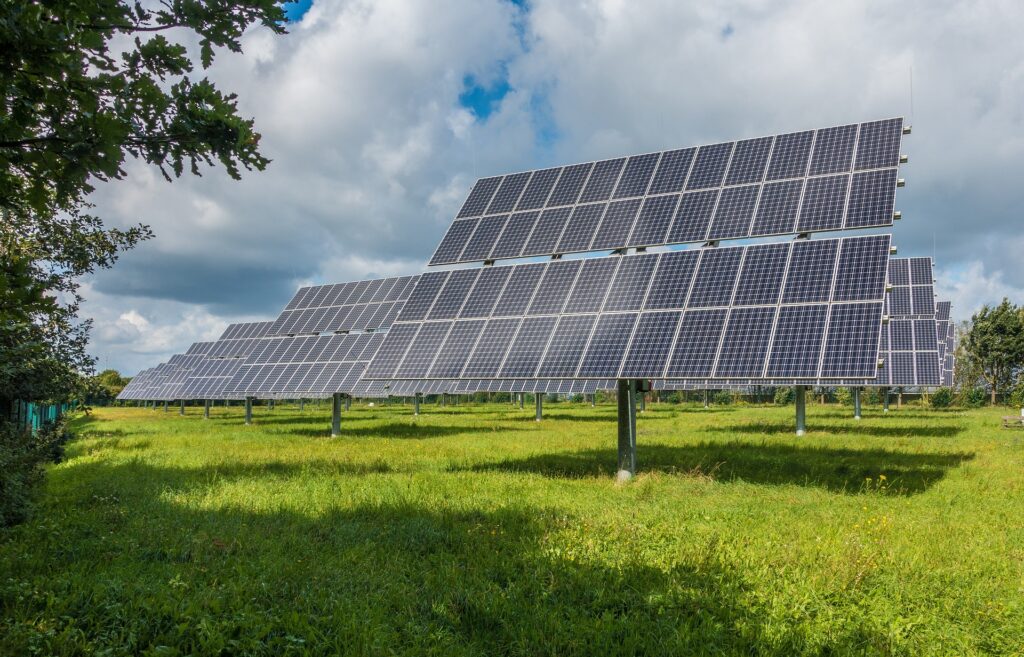For solar systems, lithium-ion batteries are the best due to their high energy efficiency and long lifespan. They outperform lead-acid batteries in terms of capacity, cycle life, and depth of discharge.

When selecting a battery for your solar system, it’s crucial to consider factors such as cost, performance, and maintenance. Lithium-ion batteries have gained popularity in the solar industry due to their ability to store more energy, require less maintenance, and have a longer lifespan.
They are a suitable choice for off-grid and grid-tied solar systems, offering reliable and efficient energy storage solutions. Additionally, lithium-ion batteries are environmentally friendly, as they do not emit harmful gases and are easily recyclable.

Importance Of Choosing The Right Battery
Solar systems are dependent on reliable power storage to function optimally. As such, selecting the best battery is crucial for maximizing efficiency and ensuring uninterrupted power supply. When it comes to a solar system, the choice of battery plays a significant role in its overall performance. This article delves into the importance of choosing the right battery, focusing on reliable power storage and maximizing solar system efficiency.
Reliable Power Storage
Reliable power storage is essential for a solar system to function efficiently, especially during periods of low sunlight or at night.Choosing a high-quality battery ensures the consistent availability of stored energy, contributing to a reliable power supply. Opting for a battery with a longer lifespan and superior durability can minimize the need for frequent replacements and maintenance, thus reducing long-term costs. It is vital to assess the battery’s capacity, discharge rate, and cycle life to ensure it aligns with the energy requirements of the solar system.
Maximizing Solar System Efficiency
Maximizing solar system efficiency heavily relies on the selection of the right battery.By choosing a battery that can efficiently store and discharge energy, the solar system’s overall performance is optimized. A battery with higher energy density and efficient charge/discharge capabilities can enhance the utilization of solar energy, enabling the system to operate at peak efficiency. Factors such as depth of discharge, charging efficiency, and maintenance requirements should be carefully considered when selecting a battery to maximize the efficiency of the solar system.
Types Of Batteries For Solar Systems
Solar systems rely on storage batteries to provide power during periods of low sunlight. There are different types of batteries available for solar systems, each with its own unique features and benefits.
Lead-acid Batteries
Lead-acid batteries are one of the most common types of batteries used in solar systems. They are affordable and have a long track record of reliable performance. These batteries are available in two main variants: flooded lead-acid (FLA) and valve-regulated lead-acid (VRLA).
Lithium-ion Batteries
Lithium-ion batteries have gained popularity in the solar industry due to their high energy density and long lifespan. They are lightweight and compact, making them an ideal choice for off-grid solar applications. These batteries also offer fast charging and discharging capabilities.
Flow Batteries
Flow batteries are a promising technology for solar energy storage. They work by using electrolyte solutions stored in external tanks, allowing for scalable and customizable energy storage capacity. Flow batteries are known for their long cycle life and the ability to discharge 100% of stored energy without damage.
Pros And Cons Of Lead-acid Batteries
Lead-acid batteries are commonly used in solar systems due to their long lifespan and reliable performance. However, like any other technology, they come with their own set of advantages and disadvantages. It is essential to have a clear understanding of these pros and cons before making a decision for your solar system.
High Initial Cost
One drawback of lead-acid batteries is their high initial cost. Compared to other battery types, lead-acid batteries tend to be more expensive upfront. This can make them less appealing to those on a tight budget. However, it’s important to note that the initial cost is offset by their long lifespan, making them a cost-effective choice in the long run.
Long Lifespan
Despite the high initial cost, lead-acid batteries have a long lifespan compared to other battery options available for solar systems. On average, these batteries can last anywhere from 3 to 5 years, depending on usage and maintenance. This extended lifespan allows users to get the most out of their investment, ensuring they can enjoy reliable energy storage for an extended period.
Low Maintenance
Lead-acid batteries require relatively low maintenance compared to other battery types. They do not require frequent watering or complicated monitoring systems. However, it is important to keep in mind that regular maintenance, such as checking electrolyte levels and cleaning battery terminals, is still necessary to ensure optimal performance and longevity. With proper care, lead-acid batteries can continue to provide consistent power without much hassle.
Advantages And Disadvantages Of Lithium-ion Batteries
When it comes to choosing a battery for your solar system, there are several options available. One popular choice is the lithium-ion battery, known for its higher energy density, shorter lifespan, and expensive price tag. In this article, we will explore the advantages and disadvantages of lithium-ion batteries in detail.
Higher Energy Density
Lithium-ion batteries are renowned for their higher energy density, making them a compact and efficient choice for solar systems. With their ability to store more energy in a smaller size, these batteries are perfect for installations where space is limited. The higher energy density of lithium-ion batteries allows for longer periods of energy storage, ensuring a steady power supply even during extended periods of low sunlight. This makes them an ideal choice for off-grid systems or as backup power sources during power outages.
Shorter Lifespan
Despite their numerous advantages, lithium-ion batteries have one significant drawback – their shorter lifespan compared to other battery types. While their high energy density is attractive, it comes at the cost of reduced lifespan. On average, lithium-ion batteries have a lifespan of around 5 to 15 years, depending on various factors such as usage patterns and environmental conditions. This means that users may need to replace their lithium-ion batteries more frequently compared to other battery types, increasing the overall cost of ownership.
Expensive
Another disadvantage of lithium-ion batteries is their premium price tag. Due to their advanced technology and higher energy density, lithium-ion batteries tend to be more expensive than traditional lead-acid batteries or other alternatives. This higher cost can significantly impact the upfront investment of a solar system. However, it’s important to note that the long-term benefits of their efficiency and compactness may outweigh the initial expense. Therefore, if budget constraints are a concern, users may need to consider other battery options that offer a more cost-effective solution.
In conclusion, while lithium-ion batteries offer several advantages like higher energy density and efficient space utilization, their shorter lifespan and higher cost must also be carefully considered. It is crucial to evaluate the specific requirements and budget constraints of each solar system before making a decision. By understanding the pros and cons of lithium-ion batteries, individuals can make an informed choice to ensure optimum performance and longevity of their solar power systems.
Exploring The Potential Of Flow Batteries
In the world of solar energy systems, efficient energy storage is crucial for maximizing the benefits of renewable power sources. As the focus on clean and sustainable energy grows, flow batteries have emerged as a promising option for storing electricity generated by solar panels. With their long cycle life and potential for complex installation setups, flow batteries offer an exciting opportunity for efficient energy storage in solar systems. In this article, we will delve deeper into the key advantages and considerations of using flow batteries in solar installations.
Efficient Energy Storage
Flow batteries provide efficient energy storage solutions for solar systems. These batteries store and release energy by using two separate electrolyte solutions, which flow through a cell during charging and discharging processes. This innovative design allows for flexible and scalable energy storage capabilities, making flow batteries suitable for a variety of energy storage applications.
One of the main advantages of flow batteries is their ability to store large amounts of energy. With their spacious external tanks, flow batteries can store more energy compared to other battery technologies. This is particularly beneficial for solar systems, as it ensures a reliable and consistent energy supply even when the sun is not shining. The high energy density of flow batteries allows for extended periods of energy usage without the need for frequent recharging.
Long Cycle Life
Flow batteries offer an extended cycle life compared to traditional battery technologies. The cycle life refers to the number of charge and discharge cycles a battery can undergo before its performance starts to degrade. With their unique design, flow batteries can achieve thousands of charge and discharge cycles without significant capacity loss.
This long cycle life makes flow batteries suitable for long-term energy storage applications, such as solar systems. Homeowners and businesses can rely on flow batteries to provide consistent and efficient energy storage for many years, ultimately maximizing the return on investment for their solar installations.
Complex Installation
It’s important to note that flow batteries require a more complex installation process compared to conventional battery technologies. Due to the nature of flow battery systems, they involve additional components and plumbing to manage the flow of electrolytes. This may require professional installation and expertise to ensure the system operates safely and efficiently.
Furthermore, flow batteries may require larger space requirements due to the external tanks needed for electrolyte storage. Proper considerations and planning are necessary to accommodate the installation of flow batteries in solar systems, particularly for residential installations where space may be limited.
In conclusion, flow batteries offer promising potential for efficient energy storage in solar systems. Their efficient energy storage capabilities, long cycle life, and ability to handle complex installations make them a strong contender for maximizing the benefits of renewable energy sources. However, it’s important to carefully evaluate the specific requirements and feasibility of using flow batteries in each solar installation.
Frequently Asked Questions Of Which Battery Is Best For Solar System
What Are The Different Types Of Batteries Used In Solar Systems?
There are three main types of batteries used in solar systems: lead-acid batteries, lithium-ion batteries, and flow batteries. Each type has its own advantages and disadvantages, so it’s important to consider factors such as cost, lifespan, and efficiency when choosing the right battery for your solar system.
How Do Lead-acid Batteries Perform In Solar Systems?
Lead-acid batteries are a popular choice for solar systems due to their affordability and reliability. They can withstand deep discharge cycles and are able to provide consistent power over a long period of time. However, they do require regular maintenance and have a shorter lifespan compared to other battery types.
What Are The Benefits Of Using Lithium-ion Batteries In Solar Systems?
Lithium-ion batteries offer several advantages for solar systems. They have a longer lifespan, require less maintenance, and are more energy-efficient compared to lead-acid batteries. Additionally, they have a higher power density and can provide more energy storage capacity, making them a great option for residential and commercial solar installations.
Conclusion
To summarize, choosing the right battery for your solar system is crucial for its efficiency and longevity. It is important to consider factors like battery capacity, lifespan, and maintenance requirements before making a decision. By doing proper research and understanding your energy needs, you can make an informed choice.
Remember, investing in a high-quality battery will ensure optimal performance and maximize the benefits of your solar system. So, choose wisely and enjoy the long-term benefits of renewable energy.